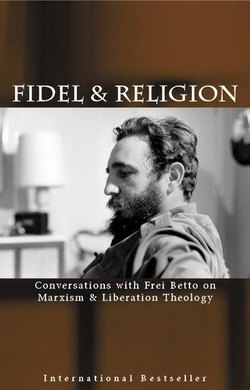Читать книгу Fidel & Religion - Fidel Castro - Страница 10
На сайте Литреса книга снята с продажи.
ОглавлениеFOREWORD
ARMANDO HART
Some truths are hidden in the tangled skein woven in the course of millennia of obscurantism. In the early years of the revolution Fidel Castro said, “We were wedded to lies and forced to live with them; this is why it seems that the world is overwhelmed when we hear the truth.”
The heavy veil thrown over the possibilities of promoting close political ties between Christians and communists is drawn back in this interview that Fidel granted to Frei Betto, a Brazilian Dominican friar. Readers are presented here with an “amazing” happening to be read and studied, and if we stick strictly to the definition given in the dictionary, we might say that those who study this talk in depth will find “an extremely outstanding or unusual event, thing, or accomplishment — that is, a miracle.”
A practicing Catholic with deep Christian faith and a communist leader well known for his firm principled position held an extensive dialogue, and, when the exchange was over, each felt surer of his own convictions and more interested in establishing closer, deeper relations in the practical political struggle. Moreover, each had based his arguments — and this may be the most interesting aspect for researchers — on the original sources of Christianity and Marxism. Neither of them has ceded at all in his principles, and each understands the other deeply on such important topics as morality, contemporary economic and political problems, and the need for Christians and communists to unite in the struggle for a better world.
This isn’t, however, a unity conceived of only on the plane of a tactic of struggle. It isn’t just a happenstance or a political alliance. It is, of course, by definition, but the tie that is established here on the ethical or moral plane concerning an individual’s role — whether they be a Christian or a communist — in defense of the poor has the nature of a lasting, permanent, strategic alliance. It is a proposition with a solid moral, political, and social basis. This, in itself, is a tremendous achievement in the history of human thought. The ethical-moral note appears in these lines to bear the human feeling that unites fighters for freedom and in defense of the poor and exploited.
How did this miracle come about? Social theoreticians, philosophers, theologians, and a whole range of intellectuals in different countries should ask themselves this question. Moreover, Christians will surely feel obliged by their beliefs to ask it of themselves, as will Marxist-Leninists. The Cuban people have made a revolution, know Fidel Castro well, and know what this dialogue is about.
The reactionaries’ beloved dogma of the impossibility of an understanding between Christians and communists comes tumbling down when you have a deep understanding of both doctrines. Marxism-Leninism is essentially antidogmatic. It is guided by the principle formulated by Lenin that one’s point of view toward life and practice should be, first and foremost, that of the theory of knowledge — a principle that Fidel has applied in the modern world with exceptional skill.
The point of view of practice is presented in this book. It sets forth the possibility of and need for deep human understanding among all who honestly struggle for the peoples, no matter what their ideas about God and religion may be.
To appreciate once more the consequences of Fidel’s thinking, it is good to emphasize that he is setting forth ideas that he has held throughout his revolutionary life, expressed here with ever-greater breadth and depth, in their full conceptual maturity and richness. We should recall his 1971 talk with Catholics in Chile, his 1977 meeting with ministers in Jamaica, and that phrase of his in the first few years of the revolution: “He who betrays the poor betrays Christ.”
This book brings out important roots of Fidel Castro’s ethical training, how he was influenced by his elementary and secondary school education in the best Catholic schools in Cuba. This training, of course, included the tradition that has been handed down to us from the last century and that was summed up in the historically important moral messages of Félix Varela, José de la Luz y Caballero, and especially José Martí. This ethical element may well be one of the most important aspects of the dialogue.
Thus, a deep exchange of ideas — not only at the tactical and political but also at the strategic and moral level — has been initiated between forces that, up until very recently, seemed to be unable to understand each other. It took place in Latin America because this is a region in tumult, where an acute economic, political, and social crisis is reflected in all of the people’s spheres of cultural and spiritual life as an announcement of the inexorable changes that will take place, one way or another; because the Cuban revolution has already ushered in a stage of great renovation for socialism that has reached the region’s essence and roots; because of the unquestionable contribution that the Nicaraguan revolution and the processes that are taking place in El Salvador and other countries have made and are making to this topic; and because part of the Catholic church and other Latin American and Caribbean Christian currents are expressing an issue that has very old roots in a new way: what the role and mission of believers is with regard to social and political problems.
Two of the most important historic wellsprings of human thought and emotions — Christianity and Marxism, which the enemies of human progress have always presented as irreconcilable — have found new and surprising paths of understanding here. This is a question on which all who are sincerely concerned over the future of humanity will surely wish to meditate.
Havana, 1985
